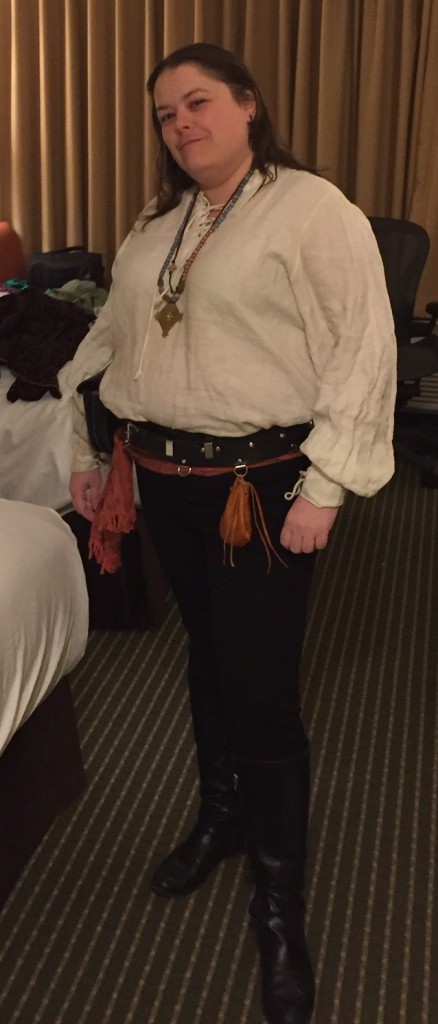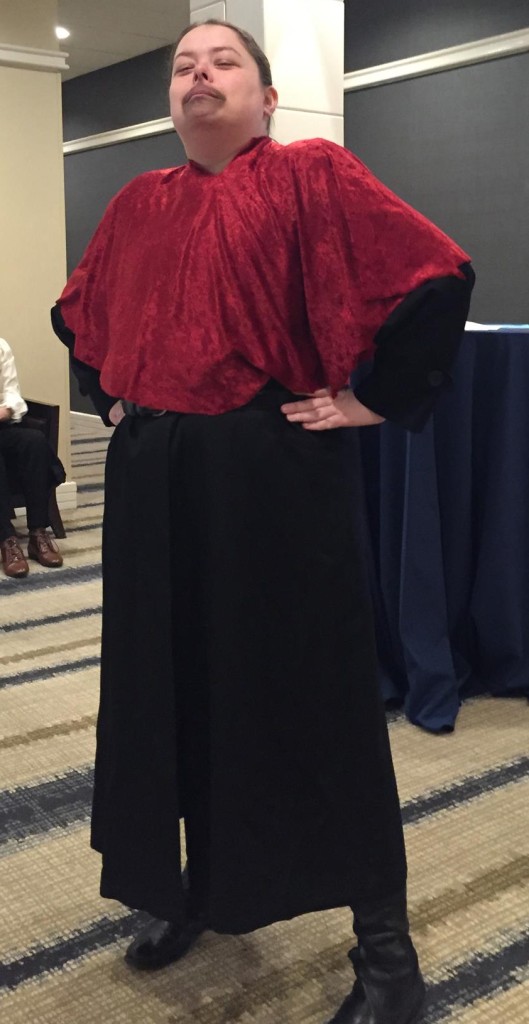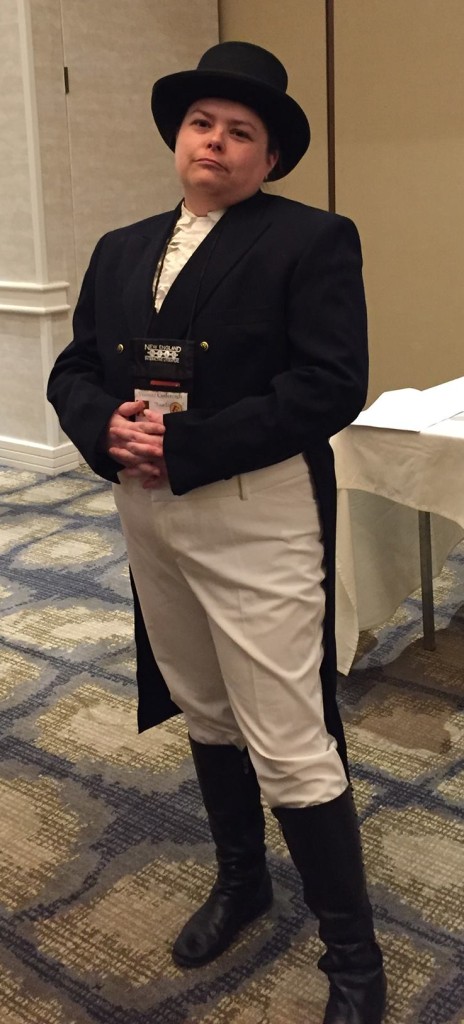Intercon Pirates! — I feel the exclamation point is necessary — was this past weekend. Despite some preliminary anxiety, this was probably one of my low-key and unstressful Intercons ever.
This was our first year at a new hotel, as our beloved Chelmsford Radisson told us it was washing its hair every weekend for the rest of forever. Instead we found ourselves at the Doubletree in Westborough, MA, and on a weekend two weeks before our usual date. This meant that the biggest LARP event of the year for me conflicted with Boskone, which I had dearly wanted to attend. (I did end up sneaking off to visit with friends at Boskone on Saturday).
I arrived at the con late on Thursday afternoon. I was still easing into extroversion after a rough winter, so I admit I spent a good chunk of that evening hiding out in my room (or a friend’s) playing Crusader Kings II instead of going to panels or socializing. However, I did attend parts of…
Pre-con
I made it to the Renaissance Dance workshop led by larper and SCA dancemaster Justin, which was a lot of fun. We spanned several centuries, learning bransles, allemanes, and even some English country dance. It’s always funny to me how many similarities I can find with contra dance — which I do a lot of — and yet how blasted bad I can still be at it. I have a left/right problem, which doesn’t help.
The other pre-con event that stands out for me was The Social Contract of LARPing panel on Friday afternoon, which was near and dear to my heart after a post I wrote years ago on just that topic. I already knew, going in, about the many unspoken assumptions of the larp community (and the Intercon community in particular); but this brought to light many I hadn’t thought about in depth. It made me think of Alyssa Wong’s recent words on convention culture: “If that’s the pervasive culture of your convention, that’s not intentional malice; that’s people moving naturally within a toxic milieu.” I doubt anything Intercon is doing is quite that bad, but that doesn’t mean our milieu isn’t unwelcoming, or that we don’t occasionally brush off concerns about being unfriendly as outsiders not knowing the culture.
(Relatedly, very glad to see that this year Intercon has a code of conduct and a dedicated security staff keeping it safe).
Between the Devil and the Deep Blue Sea
Between… was my first game, billed as “a swashbuckling occult four hour one-shot boffer game using the Accelerant rules told over a number of scenarios,” written by Dave Kapell, Alex Bradley, and Larisa Allen. From the moment I saw this game on the schedule I knew I had to play, if only because it listed Tim Powers’ On Stranger Tides as one of its influences. It was very much in demand, and closed in the first signup slot — but not before I got in.

Caroline Skive
I played Caroline Skive, the first mate of the Red Lady, with my mother (played by Jen B) as captain, and my sister (Hannah R) as the captain of the rival ship the Shatterjack. My goals revolved around reuniting my family and seeing what sort of terrible trouble — foretold by the tarot card readings I’d done — awaited us.
To be honest, most of that personal plot felt unimportant for a big chunk of the game. The scenarios that made up the game were largely about crew goals, like acquiring a new ship, raiding the governor’s mansion, and finding our way to a certain cave of wonders. This is fine — I wasn’t bored, but I would have liked to feel more personal connection to the character. It was clear that family was important to Caroline, but I had a hard time living that in game. Maybe I was just having trouble easing into character given that I hadn’t larped in a while… or maybe it’s due to another problem I experienced in this game — my level of immersion.
My immersion/ability to stay IC was rather low, which is unfortunate, considering this is usually a strength of “what you see is what you get” systems like Accelerant. I think part of it was that there were a number of players who were inexperienced with the system, and some coaching was necessary. That sort of meta discussion often drives me out of character. (This isn’t a complaint — I’m glad that new people are trying Accelerant, and overall they did really well — but it’s just an aspect of the situation).
Also there were some confusing rules arbitration moments — at one point I acquired a ritual that I misunderstood the usage of, in part due to some calls that were written incorrectly. Of course I didn’t realize this until AFTER I’d already used it wrongly. Dave pulled me aside and explained how it was supposed to work, which meant I had to retcon what I had already done. That never works out well, and in a WYSYWYG system, it’s even harder to swallow.
On the plus side for immersion, the claustrophobia engendered by the “ships” — tables arranged into a boat-like shape, with a limited number of places to sit — was very real. The lighting and sound design was also really good. I wish there had been the sort of neat interactive props Dave is known for, but perhaps this wasn’t a game that called for that.
Also, as my character sheet indicated I put a lot of stock in fortune-telling, I brought a tarot deck, and enjoyed doing impromptu tarot readings — which turned out to be surprisingly apt at times. Why yes, the seven of pentacles does accurately describe what’s going to happen when we raid the governor’s mansion!
Overall, I found this game enjoyable, but a little rough around the edges still. It’s nothing that can’t be refined, however, and I would definitely recommend future runs to others.
Costuming: Since Fair Escape will almost certainly want to hear details on this. This was pulled together entirely out of my costuming closet. The shirt was a white linen shirt from Matt’s costume collection, the pants and boots were street clothes, the belt and pouch were the ones I use for Ianthe in 5G, and the earrings were ones I used NPCing as the Queen of Jerusalem in 12th century Shadows of Amun. Everything else — sash, jewelry, coin pouch — was all just random tat I had lying around. I had actually found a coat at Savers that I wanted to use as a pirate coat, but when I tried it on with the full costume, it just didn’t work.
1493
On Saturday morning I played in 1493, by Betsy Isaacson and Elisabeth Cohen. As I understand it, this game was written for sixth graders to teach the age of exploration in Western history. Given that, it is basically historical in scope (with some small adjustments to make female characters have more agency), with no weird supernatural stuff going on.
The writing of the game materials, on the whole, was simple — as befits something aimed at 6th graders — but not dumbed-down; it tackled some complex political and religious concepts.

Cardinal Cesare Borgia. “You look ready to kill some musketeers,” someone told me.
This was the first of two games where I was cross-cast this weekend — this time as Cardinal Cesare Borgia. I joked that my character sheet was basically, “My dad’s the Pope! I do what I want!” but I mean no slight by that. The character’s goals evolve quite naturally from that, and they kept me busy the whole game. Having great co-conspirators (Kelly D. as Alessandro Farnese and Katie G. as Ludovico Sforza) was also a ton of fun. (I had serious beard envy of Sforza. I know Katie plays a dude in 5G Wrathborn, so she knows her way around a facial toupee).
As Cesare, I succeeded in getting the Papacy declared a hereditary peerage (ruled by the Borgias, natch), gave the Pope’s blessing to Princess Margaret’s unborn child, and married the Duchess of Brittany (Quinn D), who became a queen again when I freed her from French tyranny by annulling her marriage to the King of France.
I feel this is a strong game, and would definitely recommend it. If I have complaints, they were more about the length of the game — at two hours, it felt too short for the amount of plot I had. On the other hand, other characters looked a bit lost, such as the folks playing the natives of the New World. I also know Matt (playing Prince John of Asturias) was annoyed to discover that even preventing a succession crisis in Spain didn’t keep France from taking over; he felt he was pretty much doomed to failure, with no way to stop that.
Costuming: I purchased a plain black trench coat and turned the collar under to use as a cassock. The red capelet and cardinal hat (not really shown in the picture) were borrowed from Alison, who had a whole bunch of them made for her game Venezia. The beard was drawn on with black and brown eyeliner.
Congress of Vienna
Congress of Vienna, by Ben Philip and Kristen Patten, is very much your standard secrets-and-powers larp, taking place in 1815 at the titular conference. Historically, the Congress of Vienna pieced Europe back together post-Napoleon. In-game, well… things were a little different.
This game does say in its description that it is a political game “with some weirdness,” so I went in expecting a certain amount of magic and/or supernatural elements. But what I really liked about this game is that it wasn’t about those elements, and while I could look on and watch crazy shit happen like Louis XVI coming back from the dead and King George III becoming magically sane again, it didn’t actually affect what I was there to do — the political sausage-making of creating a treaty.
I played Robert Stewart, Viscount Castlereagh, representing Great Britain’s delegation at the Congress. Castlereagh is a real historical figure, apparently so hated by Lord Byron that the poet wrote a eulogy inviting people to piss on his grave. As far as I can tell Castlereagh was one of the major players in the actual Congress; he is largely responsible for how Europe got divided up, which kept the peace until WWI.
It’s a spoiler — but only a minor one — to say that Castlereagh is one of the most mundane characters in that game. And his normalness is his fucking superpower.
This is illustrated by ability usage — a lot of the diplomats had a “tell me what you really think” ability to look at other player’s goals. So, people would use this ability on Castlereagh, and get things like, “make sure a treaty is signed,” “protect your family,” or “make sure the King is safe.” I’d use the same ability on them, and get things like, “figure out who is trying to steal your body.”
I pretty much got what I wanted in this game. Great Britain doesn’t have all that much of a horse in the division-of-Europe race, so mostly Castlereagh wanted to balance power on the Continent. The one issue where I couldn’t get traction was the annexation of Saxony by Prussia, but it was clear to me that I wouldn’t hold up the treaty just for that. I also got both Austria and Prussia into the German Confederacy, and made sure that if Russia wanted the Grand Duchy of Poland, they had to at least constitute it from their own land. I still think Austria is over-powerful, but maybe we’ll prevent WWI for a few extra years in this timeline.
I had a few moments of concern when King George suddenly became sane again, and indicated he wanted to take my place at the treaty table. However, after getting briefed on the state of the treaty, he told me, “you know what you’re doing, you know what I want, I’ll leave it in your capable hands,” and ran off to do mystical stuff involving the spiritual leader of Europe. I’m not sure if that was the player realizing he would basically end my game if he did that, or if the character just had other stuff to do.
Overall, I thought it was brilliant –and rare — that despite being Captain Normal in a game with a lot of weirdness, I got to the end and didn’t feel like I’d been playing the wrong game. Other stuff was clearly happening, but what I accomplished still felt real.
Also, I am really sad that I didn’t have more of an IC reason to interact with Lafayette (Alex P), or to give the King of Saxony (Aaron N) what he wanted. The players clearly knew their history, and it was interesting just to talk to them on that level — even if only after the game.

Robert Stewart, Viscount Castlereagh
Costuming: this was probably my most involved costume — but it was still almost entirely thrifted! Following instructions in Instant Period Costumes, one of my favorite thrift-costume books, I turned a men’s suit — $15 at Savers — into a Regency-era tailcoat. I added slim-leg white pants from Target, my riding boots, a white Victorian-ish shirt recycled from a Hellsing cosplay, and a cravat I threw together in 30 minutes with leftover eyelet lace and hot glue. Oh, and Mel loaned me a hat. I brought along a men’s waistcoat to wear underneath the tailcoat, but it ended up too long for the high-cut coat, so I didn’t end up using it.
And Now, For Something Completely Different…
Those were basically my games — which meant that functionally, my con ended at 6pm on Saturday. Given that, I decided to take a trip into Boston and visit with folks at Boskone. In particular, I wanted to see my dear friend Django and his girlfriend Casey. Living across the country, I hadn’t seen him since… 2007? 2008? and I didn’t want to miss the opportunity when he was actually in my neck of the woods. I also had never met Casey before, and wanted an introduction.
It turned out to be a strange “six degrees of separation” experience. I knew going in that Casey was a Viable Paradise grad, the same year as my larp pal and VP16 grad Kevin/Kellan — I, of course, am VP17. I figured we’d have something to talk about in that regard.
What I didn’t know beforehand was that Casey was also a Vassar grad — class of 2010 to my class of 2003. Moreover, she’d been involved in the NSO, the geek club I was an officer of. She was interested to learn that I had been part of the team that founded Noncon, Vassar’s annual SFF convention. We talked about the craziness of the English department at Vassar, the disorganization of the NSO library, what dorms were considered party dorms when she attended, etc.
(Even weirder degress of connectedness: Congress of Vienna, the game I was coming from, is written by Ben Philip, not-so-secretly known as Benjamin C. Kinney, VP19 grad, and Vassar class of 2002. Also an NSO officer and co-founder of Noncon).
I felt a little guilty because I think I spent more time reminiscing with Casey about Vassar than I did talking to Django! I do love it when I meet someone’s S.O. and they turn out to be even more awesome than I had hoped. In my defense, we did also talk our respective writing projects, Django’s books, anime, and various SFF fannishness.
Eventually we headed to the bar to play board games with other writerly folks — Fran Wilde (or, as we were all calling her that night, “Nebula award-nominated Fran Wilde”), and another VP16er, Lauren Roy, and their husbands. We played Code Names, a party game by Vlaada Chvatil, which I thoroughly enjoyed. Max Gladstone joined us for the final round, and helped turn his team’s loss into a victory — surprising no one, it is a game he is really good at.
Alas, I had to leave shortly thereafter — I didn’t know when the T stopped running, and I was depending on it to get back to my car.
The Rest of Intercon
The rest of the con was mostly pretty uneventful! I didn’t go to closing ceremonies, which is rare for me. I did find out that Cafe Casablanca is running in October in Chicago, which I have already signed up for — I’ve been wanting to play for a while. I ended up going to lunch with Mel, Will, Kevin R., and a bunch of RPI grads, which was as much of a dead-dog party as I got.
Overall, it was a pleasant weekend, and it makes me want to start writing larps again. A dangerous pastime, that…


